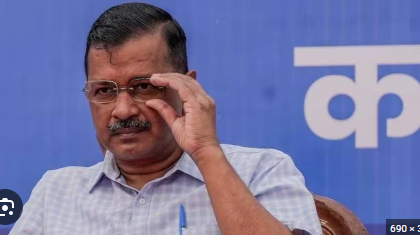Manas Dasgupta
NEW DELHI, Feb 7: A Delhi court has directed Delhi Chief Minister Arvind Kejriwal to appear on February 17 and explain why he has skipped five summons from the Enforcement Directorate which is investigating alleged money laundering linked to the liquor excise policy scam case in the national capital.
“Cognisance of the complaint has been taken and summons is being issued to him to appear on February 17,” Additional Chief Metropolitan Magistrate Divya Malhotra said. The judge had earlier reserved the order after the ED submitted that it had concluded its arguments in the matter.
The ED had on February 3 filed a fresh complaint case against Mr Kejriwal for the non-compliance of its summons. It said he, as a public servant, could not ignore the orders of a government agency. Mr Kejriwal’s Aam Aadmi Party (AAP) has said it was “studying the court order… and will take action as per law. we will tell the court how the summons are illegal,” the party sources said.
Mr Kejriwal had snubbed the ED’s fifth summon on February 2. He had earlier skipped summons issued on November 2 and December 21, 2023, January 19 and January 31, 2024, accusing the ED of acting under orders from the BJP-led centre to target rivals before the Lok Sabha election. He did not respond to the first because he was campaigning for the Madhya Pradesh election, and ignored the others citing various prior commitments, including a 10-day meditation retreat.
The party has slammed the ED’s actions as “politically motivated” and has complained that Prime Minister Narendra Modi’s “sole aim… is to arrest Arvind Kejriwal and topple the Delhi government.” Mr Kejriwal was earlier questioned in this case – for nine hours – by the Central Bureau of Investigation; this was in April last year. He is not an accused so far. “CBI asked 56 questions (but) everything is fake. Am convinced they don’t have a single piece of evidence,” he had said. But two senior members of his cabinet have been arrested and are in jail in the same came. His deputy Manish Sisodia was arrested in February, last year and Mr Sanjay Singh in October.
The case refers to allegations the AAP government’s revamped alcohol sales policy allowed it to receive crores in kickbacks from cartels, and that this money was channelled into funding poll expenses in Goa and other states. Specifically, both the ED and the CBI have alleged the policy allowed cartelisation and favoured certain dealers, who paid bribes for liquor sale licenses.
The AAP has strongly refuted all charges. The Delhi government reported a 27 per cent increase in income from the policy and generated ₹ 8,900 crore in revenue. The party has also accused the BJP of manipulating the central agency to target it.
A day earlier, premises linked to several AAP leaders, including Mr Bibhav Kumar, one of the closest and oldest aides of Mr Kejriwal, were raided in a further expansion of the ambit of investigations against the embattled party. Tuesday’s raids by the CBI, which the AAP has claimed lasted “23 hours”, were carried out in connection with alleged illegal monetary gains to a private company for the supply, installation, testing and commissioning of water meters by the Delhi Jal Board (DJB). Besides Bibhav Kumar, the office of AAP treasurer N D Gupta, residences of former DJB member Shalabh Kumar, a chartered accountant (CA), Pankaj Mangal, and some others linked to the AAP were covered by the officials of the agency.
The raids were conducted the same day as the ED threatened legal action against AAP leader and minister Atishi for claiming lacunae in the ED’s investigation into the liquor policy case, which has seen the arrest of several senior leaders, including former deputy chief minister Manish Sisodia.
Delhi minister Ms Atishi, however, alleged that the ED officials who raided the premises of Mr Bibhav Kumar sat in the living room of his house and did not even pretend to carry out any searches. The officials did not search any rooms or look for any documents. They did not even care to explain in connection with which case they had gone there, she said at a press conference.
The ‘panchnama’ document showed that the ED team took with it just two Gmail account downloads and three family phones from Mr Kumar’s house, Ms Atishi claimed. The ED raids are nothing but an attack on Kejriwal to crush him because he is the only one who openly challenges the BJP and Prime Minister Narendra Modi, she charged.
About 10-12 premises in the national capital were covered by the ED as part of the raids carried out under the Prevention of Money Laundering Act (PMLA). The tightening net around the AAP incidentally seems to hew close to a BJP timeline of a “400-day plan” by the party – leading up to the Lok Sabha elections and continuing till the 2025 Delhi Assembly polls – against the AAP, centred around “10 specific allegations of corruption in government departments.” These included the liquor policy case, DJB allegations, charges regarding maintenance of public buses, and alleged corruption in the construction of classrooms.
Probes are now on in all the cases, with a majority of them starting out as police complaints or inquiries by bodies such as the Directorate of Vigilance and Anti-Corruption Branch (which come under the Lieutenant Governor and hence the Centre’s purview), before landing on the desks of central investigation agencies.

